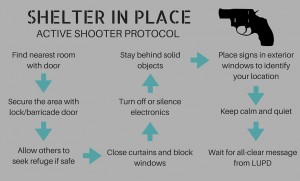 A week after a shooting at an Oregon community college where nine students were killed by a fellow student at the school, a new threat surfaced targeting colleges in the greater Philadelphia area. The threat alluded to a potential shooting at a Philadelphia-area college or university to take place on Oct. 5 at 2 p.m.
A week after a shooting at an Oregon community college where nine students were killed by a fellow student at the school, a new threat surfaced targeting colleges in the greater Philadelphia area. The threat alluded to a potential shooting at a Philadelphia-area college or university to take place on Oct. 5 at 2 p.m.
Subsequently, the Lehigh University Police department notified the community that security would be heightened on campus that day.
Lehigh has university-wide policies and instructions that come from the Lehigh University Police Department and the Office of Residence Life in case emergencies like natural disasters, an active shooters or a bomb threat. However, when faced with a potential emergency, some students are uninformed of these procedures.
Joe Sterrett, the chair of the Crisis Management Team at Lehigh, said there are two dimensions of increased security. One condition of increased security is attention to activities that might not spark concern during the average day, such as unusual-looking vehicles.
The other dimension is a more personnel coverage, according to Sterrett.
“It isn’t that they hire new people, but they work lower shifts that overlap in the same spots that ensures we are able to cover the entire campus and be aware of what is going on,” he said.
Sterrett said the LUPD determines how increased security is different from regular security.
“From the perspective of our Crisis Management Team, that’s a fully delegated set of responsibilities,” Sterrett said. “We are not managing campus security. We are fully being aware of what they are doing with their protocol. There is a response, yes, but it doesn’t mean on any given day that they aren’t doing those things anyway.
“It’s a human psychological phenomenon that once you’ve been attuned to something you tend to look much more carefully and see things you wouldn’t normally tune into. That’s part of elevating alert status for anybody.”
LUPD Chief of Police Edward Shupp ultimately decides when to increase security. He said the choice depends on the type of situation, threat, incident and breadth of available information, and it is determined on a case-by-case basis.
Shupp said the best thing students can do is be aware of what is happening around them and on their own campus. He encouraged community members to follow LU-ALERTS, emails and any other information provided by the police.
“We will always air information,” Shupp said. “Threats will not always be directed against Lehigh, but we will notify the community. The threat was in Philadelphia – it wasn’t here, but we’re close enough that we want people to be aware.”
Shupp said that while the police department cannot always release sensitive information, it tries to be as transparent as possible with students.
According to Ashley Lemmons, an assistant dean of students and the director of Residence Life, there aren’t guidelines that can cover every possible situation, particularly violent incidents within close proximity to the university with little or no warning.
“In general, the response to an active shooter is dictated by the specific circumstances of the situation,” Lemmons said. “Therefore, the Office of Residence Life takes the directives from LUPD on the specifics of the situation.”
Residence Life and the LUPD also strongly encourage all students to notify a member of the Dean of Students staff, Gryphons or the police of any suspicious behavior.
Katy Traut, ’17, a Gryphon in Trembley Park, said in a potential emergency she would first alert other Gryphons and assistant directors of Residence Life and wait for further instructions.
However, the emergency protocol for Greek houses can be less structured. Ali Nestle, the risk manager of Alpha Omicron Pi sorority, and Jenna Guma, the standards chair of Kappa Delta sorority, both said neither of their chapters have a specific plan of action in place in case of an emergency.
“The protocol for these emergencies hasn’t really been established because this is the first time it’s occurred on campus,” Nestle said. “If it is something very serious the plan of action is to evacuate and go off campus to people’s homes nearby or off-campus houses.”
She said that as risk manager, she feels more prepared to handle less serious risks.
“I mandated that people keep their doors locked and that no one let anyone into the house that wasn’t a Kappa Delta,” Guma said. “I think if anything, it made me personally aware that we as a sorority, but also as Lehigh, don’t have any specific protocol.”
However, a school-wide response protocol for the university called Shelter in Place is a protective action to stay inside a building to avoid external hazards, which includes natural disasters, hostile intruders or a hazardous material release.
The steps for Shelter in Place in case of an active shooter include: going to the nearest room with a door, securing the area with a lock and barricade the door, if safe to do so allow others to seek refuge, close curtains and block windows, turn off or silence electronics, stay behind solid objects that offer additional protection and out of sight, place signs in exterior windows to identify your location or the location of someone injured, keep calm and quiet, and wait for an all-clear message from LUPD.
Alexandra Mangino, ’18, chose to stay home from classes the day of the threat. She said she didn’t think it was worth being on campus when there was a potential threat to her safety.
“I think it is crazy that we are afraid to go to class now and to, essentially, get an education,” Mangino said. “I have a friend that goes to Syracuse and she was on lock down the other day. It was horrible. I shouldn’t be afraid for my friends to go to class.”
LUPD wants students to feel comfortable on campus. Currently, the police station is higher up on the mountain in Johnson Hall. For students off campus, this can be physically challenging to access. Students at Lehigh recognizes the difficulty of actually traversing its terrain, especially during the winter.
A new police station is under construction next to Rauch Business Center.
“It is centrally located, it covers students both on and off campus, it is in a well-traveled area, so I think the presence alone will be more accessible,” Shupp said. “We’ll have more walk-in questions. The goal was to get us a location that would put all of our services together and it more workable, manageable.”





Comment policy
Comments posted to The Brown and White website are reviewed by a moderator before being approved. Incendiary speech or harassing language, including comments targeted at individuals, may be deemed unacceptable and not published. Spam and other soliciting will also be declined.
The Brown and White also reserves the right to not publish entirely anonymous comments.